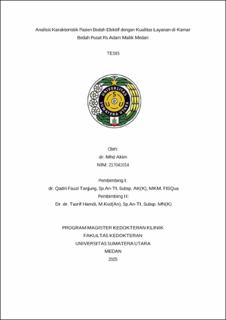Analisis Karakteristik Pasien Bedah Elektif dengan Kualitas Layanan di Kamar Bedah Pusat RS Adam Malik Medan
Characteristics of Elective Surgery Patients and Quality of Operating Room Services at RS Adam Malik Medan
Abstract
Introduction: Elective surgery is a planned medical procedure requiring optimal
coordination from the preoperative to postoperative phases. As a national referral
hospital, H. Adam Malik General Hospital in Medan handles a high volume of
elective procedures, making service quality evaluation essential. This study aimed
to describe patient characteristics and service quality in the hospital's central
operating room.
Methods: A descriptive quantitative study with a cross-sectional approach was
conducted, involving 580 patients undergoing elective surgery. Data were collected
from medical records and analyzed using SPSS.
Results: Most patients were aged 18–40 years (48.8%), with a mean age of 40.5 ±
22.42 years. Females accounted for 53.8% of the sample, and the majority were
classified as ASA III (44.7%). Pain was the most common surgical indication
(45.9%), and orthopedic surgery was the most frequently performed procedure
(24%). The average body mass index was 22.44 ± 4.38. Abnormal
electrocardiogram findings were observed in 53.3% of patients, while 40% had
abnormal chest X-rays. General anesthesia was administered in 86.2% of cases.
Most surgeries occurred between 06:01 and 12:00 (69.8%), with an average
duration of 128.17 ± 126.90 minutes. A mismatch between operator arrival time
and incision time occurred in 69.3% of cases. The average postoperative pain score
was 3.47 ± 0.811, with NSAID-paracetamol combinations being the most common
analgesic regimen.
Conclusion: Overall, 70.3% of patients rated the service quality as good. However,
improvements in operative time efficiency and team coordination are needed.
Strengthening surgical scheduling management, team training, and perioperative
protocol optimization are recommended.

